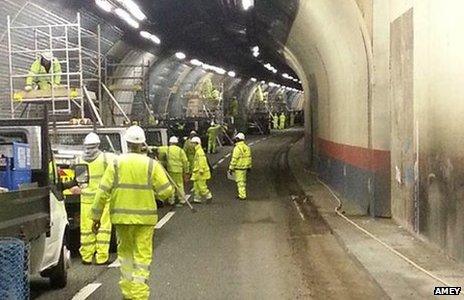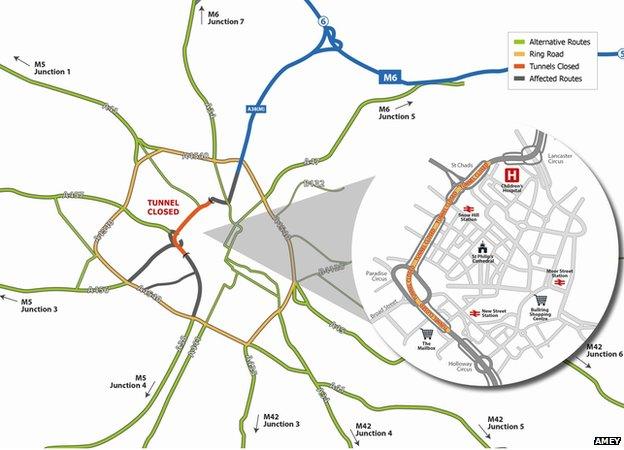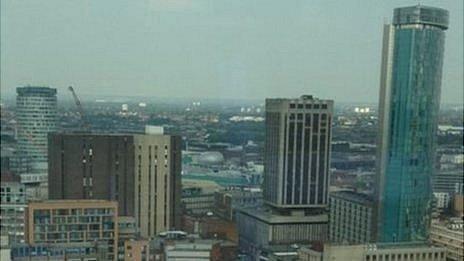Birmingham tunnel closures: What to expect
- Published
Rush-hour drivers in Birmingham have spent many a stationary moment in the tunnels, dreaming of a speedier journey
To anyone driving into the UK's second largest city, they are one of the most recognisable parts of Birmingham.
But from 22:00 BST on Friday 19 July, the St Chad's and Queensway tunnels, which connect the centre with routes to the north of the city, closed completely for six weeks for refurbishment.
City council leaders and Amey, the company carrying out the work, said the 40-year-old tunnels need the work and total closure is the best way to get the job done.
However, the president of Birmingham's Chamber of Commerce is planning to boycott the city centre and said he expected the closure of the tunnels to lead to gridlock on the city's already-busy roads.
So what do the closures mean for people travelling into the city?
Why are the tunnels closing?
This year's revamp will be the first large-scale work done on the tunnels since they were built in the 1960s and 1970s.
They are undergoing two major facelifts, closing them completely for six weeks this summer and next.
On top of that, the tunnels were shut overnight for four weeks before the complete closure and will close between 22:00 and 06:00 BST for another two weeks once they reopen. There will also be more overnight closures next year.
During the 2013 work, engineers will reinforce the tunnels' structures, improve fire escapes, coat the tunnels with fireproof material, install new lighting and generally try to improve their appearance.
Next year the work will concentrate on electrics within the tunnels - installing new emergency and communications systems, CCTV and controls to alter the lighting.
The city council said traffic levels were up to 20% lighter during school holidays and working on both the tunnels during the day and night for six weeks would be cheaper than just closing them overnight or working on them one tunnel at a time.
At any one time during the full closure there will be 200 members of staff working on the tunnels during night and day.
Do they need to be completely closed?

The tunnels will be shut completely until 2 September
Amey said it had looked at different options involving keeping the tunnels partially open, including closing them in the evenings and weekends.
However, the company said that would take a minimum of 25 weeks to complete and affect things like visitors coming to the city for Christmas shopping.
Full closure means the work can be contained during the six weeks of the school holidays.
Amey said it would be checking progress on a daily basis and would "do everything in its power" to complete the work as quickly as possible.
It said it would also aim to keep noise from the work to a minimum to avoid disturbing nearby businesses.
How will it affect drivers?
Diversions have been put in place but drivers have been advised to avoid the area around the tunnels altogether if possible - and not to rely on satnavs, which could lead them in the wrong direction.
Greg Hallsworth, from traffic monitoring company Inrix , said that although there would be less traffic during the school holidays, an average of about 85,000 vehicles use the tunnels each day.
He said he predicted the busiest junctions while the work is carried out would be Paradise Circus, St Chad's Circus and Lancaster Circus.
Amey has produced a guide to how to get to places, external such as the Bullring, Birmingham Children's Hospital, New Street station and the Hippodrome.

However, it advises motorists the best move is to ditch their cars altogether in favour of various other options:
A 500-space park-and-ride car park is being set up at Birmingham City University's Perry Barr campus. A return bus ticket to the city centre and back will cost £3, external.
National Express says it is putting on extra buses while the tunnels remain shut and has advised any motorists travelling south to Birmingham via the M6 to get off at junction seven for Great Barr and get a bus from the park-and-ride site. However, a number of bus services will also be affected by the diversions, external.
Three so-called "bike trains" are being set up, external from Perry Barr, Acocks Green and Selly Park to allow people to cycle in a large group into the city.
London Midland is urging passengers to walk or cycle to their local stations to free up parking spaces there. However, it says the stations that have more parking spaces are Stratford Parkway, Birmingham International, which is lowering its normal charges for the six weeks, Solihull and Bescot Stadium.
An extra 100 parking spaces will also be available at Kings Norton station.
How will it affect Birmingham?

Much of the traffic for the city centre would normally use the tunnels
According to Steve Brittan, the president of the Birmingham Chamber of Commerce, the tunnel closures will mean "absolute chaos".
"Birmingham's roads are bad enough at the best of times," he said.
"But having the two main tunnels closed for all that time will just be horrendous."
He said he would be boycotting the city centre and be holding any meetings he has to attend elsewhere.
"I think what I'm doing is very public-spirited and it would help Birmingham during those six weeks if other people did the same - avoid the city centre wherever possible."
He said although he does not think shops in the city centre will be too badly affected during the six weeks, he believes some businesses, including restaurants, will suffer.
"I think shopping in the city centre for many people is a one-off every now and then and they'll be prepared to come in by train for that experience," Mr Brittan said.
"But many people won't bother going into town for restaurants, they'll just stay locally instead."
Congestion hotspots
The emergency services said they had been working with the city council, Amey and transport organisations since the idea of closing the tunnels was first discussed.
West Midlands Ambulance Service said all of its crews knew which areas were affected, and where the congestion hotspots were likely to be.
Its city centre-based drivers are already proficient in negotiating their way around the alternative routes in the area, a spokesman said, which they regularly have to do whenever there is an accident on one of the main roads.
Eddie Price, from the Wholesale Traders' Association, said he did not expect the closures to have a significant effect on the market.
He said traders mostly used the city centre roads between 02:00 and 06:00 and so were finished by the time rush-hour traffic normally started to build.
Amey said it was working with West Midlands Police and would have dedicated "traffic management teams" to inspect the full diversion routes at least every two hours.
A spokesman for Network Rail said it was confident Birmingham New Street railway station would be able to cope with people choosing to take the train instead of driving.
"As it's during the school holidays we have significantly fewer passengers anyway," he said.
"And even though the building work [at New Street] is still ongoing, we now have much more space than we did before the new entrance opened in April."
But the tunnels' closure is not seen as bad news by everyone.
Shopping Tamworth tweeted earlier this month: "Birmingham city centre tunnels closed from 19th July to 2nd September, traffic chaos, stay local, shop local, shop #Tamworth"
However, a spokeswoman for Tamworth Borough Council said it fully supported the work being carried out by Birmingham City Council and did not intend to capitalise on any trouble caused.